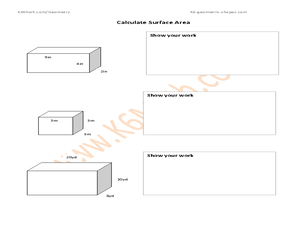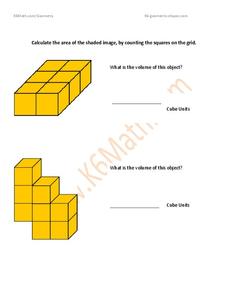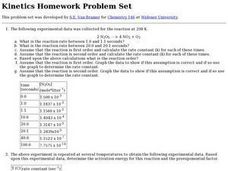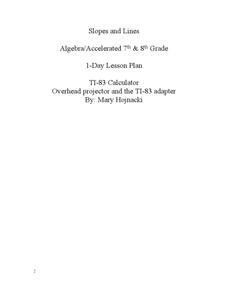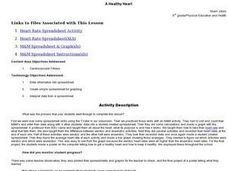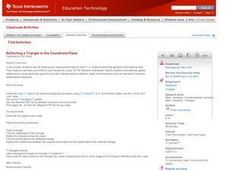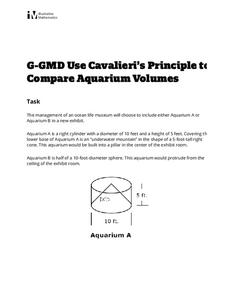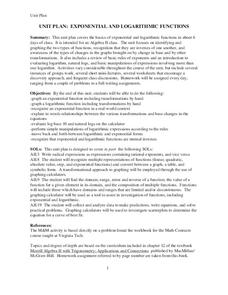Curated OER
Calculate Area Using Grids
In this area activity, students use shaded grids to calculate area, writing area in square units. A reference web site is given for additional activities.
Curated OER
Calculating Area
In this area worksheet, learners calculate the area of shaded figures shown on grids. A reference web site is given for additional activities
Curated OER
Calculate Area
In this area worksheet, students calculate the surface area of 3 given shapes, showing their work in spaces provided. A reference web site is given for additional activities.
Curated OER
Calculate Area Using Shaded Grids
For this area worksheet, students calculate area of shapes using shaded grids, writing answers in cube units. A reference web site is given for additional activities.
Curated OER
Kinetics Homework Problem Set
In this chemistry worksheet, learners determine the reaction rate as specified for each in seconds. Then they determine the activation energy for the reaction and preexponential factor as stated. Students also determine the concentration...
Curated OER
Slopes and Lines
Learners identify the slopes of a line. In this algebra lesson, students calculate the slope and intercept of a line. They graph their lines using a TI calculator.
Curated OER
A Healthy Heart
Sixth graders create a spreadsheet using specific data. A speaker comes to discuss the heart, and the difference between anaerobic and aerobic activity. They make posters to encourage a healthy heart lifestyle.
Curated OER
Summer Machines Activity: Cool Tools
Students examine and think about various tools in their surrounding environment to facilitate development of their primary observation and sorting skills. In this tool observation lesson, students first sort a variety of tools any way...
Curated OER
Graphing Quadratic Functions
Pupils explore quadratic functions in this algebra lesson. They investigate transformation of quadratic functions using the TI calculator. They use the vertex form for this lesson.
Curated OER
Reflecting a Triangle in the Coordinate Plane
Learners explore geometric concepts using technology. They manipulate the TI to find important math topics. This activity requires a TI-84 or higher.
Curated OER
Cardiac Hill
Students calculate pulse rates to determine level of exertion. In this human body lesson plan, students hike up a hill or steep slope and take their pulse. Students observe their breathing and energy level then record data.
Mathalicious
Three Shots
To foul or not to foul, that is the basketball question. High schoolers look at the probability that fouling out a player and allowing free throws yields a better outcome than allowing the original shot. The resource provides a teacher's...
Mathalicious
On Your Mark
With many factors leading to a great athlete, does height make Usain Bolt unfairly fast? Middle schoolers conduct analysis to change the running distance of the Olympic races to be proportional to the height of the participants. They...
Visa
Financial Forces: Understanding Taxes and Inflation
Take the opportunity to offer your young adults some important financial wisdom on the way taxes and inflation will affect their lives in the future. Through discussion and review of different real-world scenarios provided in this...
Mathalicious
Domino Effect
Carryout the instructional activity to determine the cost of pizza toppings from a Domino's Pizza® website while creating a linear model. Learners look through real data—and even create their own pizza—to determine the cost of each...
Teach Engineering
Thrown for a Loop
Round and round it goes. Class members observe a current carrying loop in a magnetic field and calculate its associated torque. They then apply what they have learned to example problems to solve for the torque and to calculate the...
PBS
The Yo-Yo Problem
What do yo-yos and pennies have to do with linear equations? Learn about writing and solving linear equations while considering the Yo-Yo Problem and Penny Pattern Exploration from the High School Math Project. Learners utilize algebra...
Teach Engineering
Solenoids
Metal slinkies, coils of wire, magnetic fields, and MRIs. To determine the safety hazards of MRI machines, class members use the provided formula to calculate the magnetic field along the axis of the solenoid.
Teach Engineering
Magnetic Fields Matter
Help your young scientists learn which materials are affected by magnetic fields with an activity that presents the information about different types of materials — diamagnetic, paramagnetic, and ferromagnetic — and their interaction...
Illustrative Mathematics
Use Cavalieri’s Principle to Compare Aquarium Volumes
Learners are designing a stunning new water feature for an aquarium, but they soon discover that more than just a pretty home for their fishy friends is required. From calculating the volume of a composite shape through the abstract...
Teach Engineering
The Advantage of Machines
Show your students how to make their work easier. The first lesson in a series of 10 introduces the class to work and the way simple machines can be make work easier. The simple machines scholars can find in everyday items are inclined...
Illustrative Mathematics
Rolling Dice
Rolling dice is a great way for your mathematicians to get a hands-on approach to probabilities. Use the chart to record whether they rolled a six during ten attempts. Calculate results individually (or in small groups) and then record...
Virginia Tech
Unit Plan: Exponential and Logarithmic Functions
A six-day unit for algebra II on exponential and logarithmic functions builds upon Chapter 12 of Merrill Algebra II with Trigonometry; Applications and Connections. The text provides assistance in the depth of instruction and homework...
Curated OER
Batting Practice: Using Math to Calculate Baseball Statistics
Students calculate and record batting average, hits, and at bats. In this Batting Practice: Using Math to Calculate Baseball Statistics lesson, students utilize mathematical formulas to determine the career statistics of baseball player...




